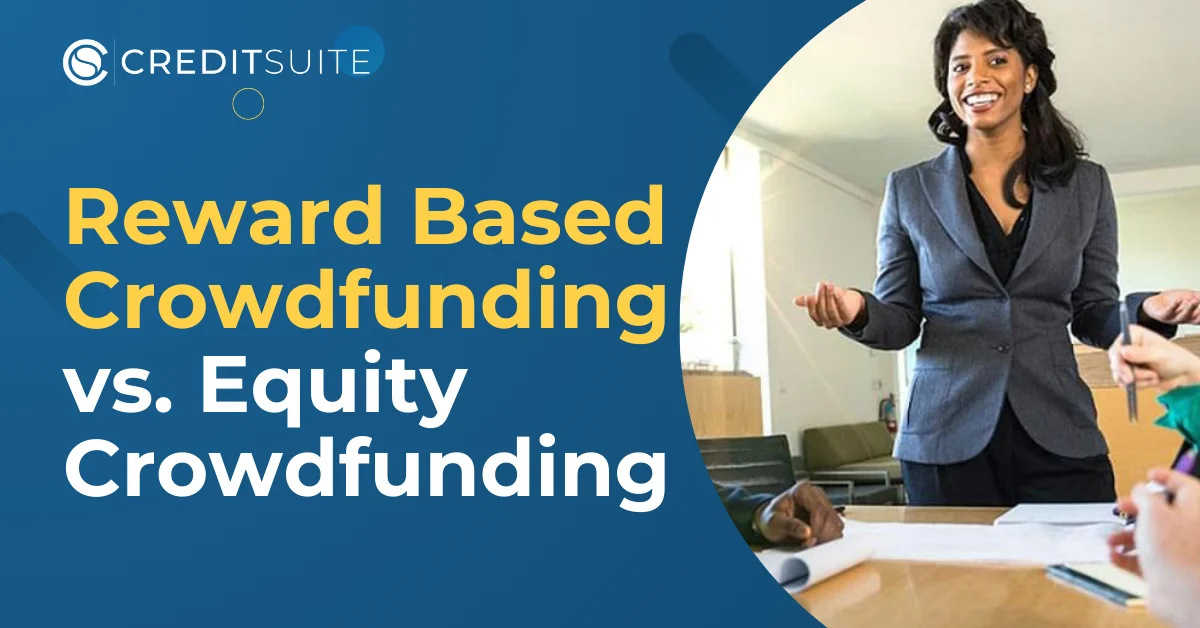Crowdfunding can be a great option for funding a business, if you run a successful campaign. The problem is, though some campaigns are very successful, many are not. It helps to understand the different options available.
Which Option is Best for Your Business: Reward Based Crowdfunding or Equity Crowdfunding?
There are many benefits to crowdfunding, the most popular being the debt free financing of your business. However, there are a couple of different types of crowdfunding, and there are even more platform options. Some options work better for certain types of businesses than others.
Credit Line Hybrid Financing: Get up to $150,000 in financing so your business can thrive.
What is Reward Based Crowdfunding
 Reward based crowdfunding is crowdfunding in which backers receive a reward for their investment. This could be something as simple as a thank you note or as elaborate as the actual product. For example, a jewelry maker may offer a free pair of earrings.
Reward based crowdfunding is crowdfunding in which backers receive a reward for their investment. This could be something as simple as a thank you note or as elaborate as the actual product. For example, a jewelry maker may offer a free pair of earrings.
One smart jacket company offered free coats with investment, and a cooler company offered free coolers. One word of warning, be sure you can keep your promises. More than one company has gone south or at least ended up in major trouble because they could not keep their promise to investors.
What are Some Benefits of Reward Based Crowdfunding?
The biggest benefit of reward based crowdfunding is that it’s one of the cheapest ways to raise capital. There is no collateral requirement and no credit check or prior business experience required. There is no need to have professional financial or legal help, as the process is simple. You do not give up any equity or control in your company, and you get tons of exposure to your audience on the front end.
That said, it’s not all sunshine. Many, if not most, campaigns do not raise enough funds to fully finance the business. That means other means of financing have to be utilized. Also, some platforms will not allow you to access any of the money if you do not reach your goal.
Reward Based Crowdfunding vs. Equity Crowdfunding
The major difference in these two types of crowdfunding is what investors get for their investment. With reward based crowdfunding, investors receive some incentive for their donation that is not equity in the company. With equity-based crowdfunding, the investor receives equity, or a share in the company.
Another difference is that, as a general rule, equity-based crowdfunding brings in larger amounts of money. This is because it draws a different type of investor. The question then becomes, why doesn’t everyone choose that? The key is, some businesses are better suited for equity-based crowdfunding and some are better suited for reward based crowdfunding.
Is Reward Based Crowdfunding Best for Your Business?
So, which types of businesses do best with crowdfunding based on rewards rather than equity? Typically, this works best for startups in creative fields. Those that do not qualify for traditional business loans, but have a strong project. Sometimes these businesses just want to test the market, and a crowdfunding platform is a great place to do that.
It doesn’t really work well for those businesses with a complicated product or service. It can be hard to explain the value of these types of companies to the masses. This type of funding tends to work best for businesses that offer:
-
New Local Services
If you think about it, this makes sense. If you want to open a local business, especially in an area where there is a direct need, it could do well with small business crowdfunding. Local Lift is designed specifically for local businesses to request funding, gauge interest, and even build a customer base before opening.
-
New High-Tech Gadgets
This doesn’t mean just a new take on what is already out there. Rather, this is something that is completely unique. That is what is going to get the most support. Also, it needs to have a working prototype and there needs to be research behind it.
-
Unique Inventions for the Home
This category gets a ton of support, especially for items that solve everyday problems. For example, the fly killing salt shotgun and the wet diaper sensor have seen great success!
-
New Tools for Cooking at Home
These are gadgets that will let you do something at home that you normally can’t. An example is carbonating your own soda. Another one is something that lets you cook things faster, or easier. Items that serve multiple purposes are another option. Maybe an easy way to make sushi at home? New kitchen tools for the home are often successful.
Platforms for Reward Based Crowdfunding and Equity Crowdfunding
How do you get started with crowdfunding of any type? There are a number of platforms out there. Some are only for offering rewards. Others allow you to offer equity as well. The most popular are Kickstarter and Indiegogo, but they are not the only players in the game.
Kickckstarter
With over 14 million backers, Kickstarter is one of the largest crowdfunding platforms in the world. They boast over 130,000 funded projects. These include products and services related to:
- Publishing
- The arts and film
- Comics and illustration
- Design and tech
Kickstarter requires you to have a prototype. In addition, projects cannot be for charity. However, nonprofits can use Kickstarter. This is one platform that does not allow equity crowdfunding.
Credit Line Hybrid Financing: Get up to $150,000 in financing so your business can thrive.
Other banned projects and perks include anything to do with:
- Contests and raffles
- Cures and medicines
- Credit services
- Live animals
- Alcohol
- Weapons
Kickstarter will collect a 5% fee on all funds. They also use a payment processor, Stripe, that applies payment processing fees (roughly 3-5%). Unsuccessful campaigns do not pay a fee. There are also fees of 3% + $0.20 per pledge. Pledges under $10 have to pay a discounted micro pledge fee of 5% + $0.05 per pledge.
Indiegogo
Indiegogo has over 9 million investors. They do not allow campaign goals below $500. Also, they charge 5% platform fees and 3% + 30¢ third-party credit card fees. Note that fees are deducted from the amount raised, not the goal. As a result, if you raise more than your goal, you will pay more in fees. They do not accept PayPal.
Indiegogo is noteworthy because they offer flexible financing in addition to fixed financing options. So, if you do not make your goal and you chose flexible funding, you can at least hold onto what you collected. This is the opposite of how crowdfunding normally works.
RocketHub
RocketHub is better suited for those who need venture capital. They give you an ELEQUITY Funding Room. There, you can pitch your idea and see if it stimulates any interest from donors.
This platform is specifically for business owners working on projects related to:
- Art
- Business
- Science
- Social
If you achieve your fundraising goal, you will pay a fee of 4%. In addition, you’ll pay a 4% credit card handling fee. But if you do not reach your goal, then that fee jumps up to 8% plus the credit card handling fee. That means RocketHub is best for companies that are more confident they will make their goals.
CircleUp
CircleUp aims to help up and coming brands and companies raise capital for growth projects. However, companies must apply and show revenue of at least $1 million to get a listing on the site. That said, the platform will sometimes make exceptions.
CircleUp can be good for those who already have a somewhat established business. That includes business owners who want both funding and guidance in order to take their businesses to the next level.
If your business gets approval for listing on CircleUp, the fee percentage comes from the total amount you raise.
GoGetFunding
GoGetFunding has been around since 2011. They let fundraisers keep the money they raise, regardless of whether they meet their target. If your business idea is unproven and you are unsure of whether you can meet your funding needs with a crowdfunding for business campaign, flexible funding can be a great option.
They charge a 6.9% fee. This is pretty high, but it includes both the platform fee and the payment processing fee. Therefore, it is actually more cost-effective than many other crowdfunding for business options.
Crowdfunder
With Crowdfunder, investors purchase equity in promising companies. They consider campaigns to be deals, and its donors are investors. Self-start listings are $499/month. Self-start plus is $999/month. In their community, there are over 15,000 investors and 200,000 startups.
Fundable
This is a crowdfunding for business platform that allows companies to raise funds from investors, customers, and friends. They have over $80 million in funding commitments.
Fundable does allow equity crowdfunding campaigns. Also, they charge $179 per month to raise funds. Fees on rewards are: 3.5% + 30¢ per transaction. They do not charge success fees.
Fundly
Fundly allows for crowdfunding for creative ventures. If your business has a creative lean, this might work for you.
There is no minimum amount to fundraise or to keep money you raise. You can usually withdraw payments within 24 – 48 hours of the donation. In addition, they offer automatic transfers. It is free to create and share an online fundraising campaign.
Yet, Fundly will deduct a 4.9% fee from each donation you get. A credit card processing fee of 3% is also taken out from each donation. Also, there are nonspecific automatic discounts for larger campaigns.
Tips for a Winning Campaign
There is no such thing as guaranteed success. These steps can help make sure you give yourself the best chance possible when it comes to fundraising through crowdfunding.
Research
You have to know your market and what demand looks like. The only way to find that out is to research. Figure out how much money you actually need before you set your goal. Lots of business owners have started crowdfunding campaigns only to find the demand isn’t there or their goal fell short of the actual need.
Make a Prototype
Truly, you have to have a sample to show investors. It’s important. People are almost always more likely to let go of money if they can see something tangible. This is so vital that Kickstarter actually requires you to have a prototype to show potential investors
Think About Which Platform You Should Choose
Once you know who your target audience is, you can determine if you would be best served by Kickstarter, Indiegogo, or another, lesser known platform. If your audience doesn’t use the platform you are on, it won’t matter how great your idea or product is. They’ll never see it.
Credit Line Hybrid Financing: Get up to $150,000 in financing so your business can thrive.
Give Good Stuff!
This is huge. Don’t make promises you can’t keep, and don’t give away the company. Still, if someone one is going to help you get started, they deserve something amazing. Offer more than a thank you note. Be bold with what you offer as a reward for their support, without harming your success.
Goal Setting is a Must
Setting goals you can reach is necessary to success. Make certain you look at the numbers in relation to actual facts before you set a fundraising goal. Be certain you have production facilities on the line that can meet the timeline goals. Do not randomly set goals with no clue what it will take to reach them.
Marketing Matters
You can’t just throw any old campaign together. If you create a video, it needs to be professionally edited. Any social media should be specifically targeted toward your audience. If they are a techy audience, pull out all the tech stops. If they are an older crew, they may need less fanfare and a more straightforward approach. The fact that videos work well reigns pretty much across audience lines however, so definitely consider a video.
Is Reward Based Crowdfunding for Your Business?
The answer is, it depends. It is worth a shot for many businesses, but for sure it should not be counted on as a total funding solution. There are some campaigns that raise all the money they need, but that is usually the exception rather than the rule. Most have to explore other funding options as well. However, you will have a much higher chance of success if you choose the right type of crowdfunding, the right platform, and the perfect marketing plan for your specific business.



